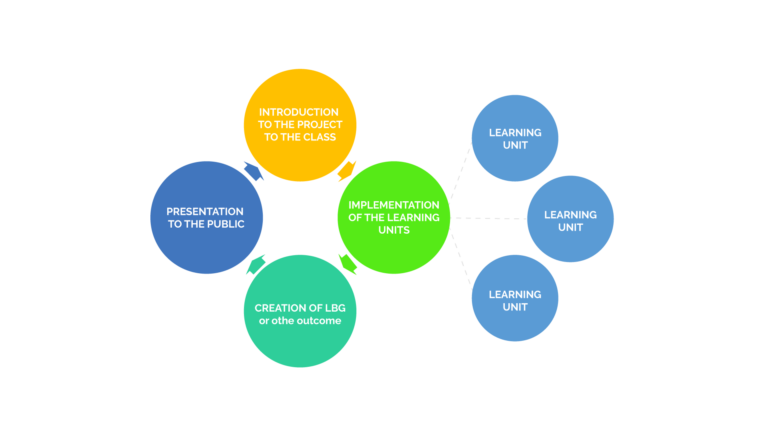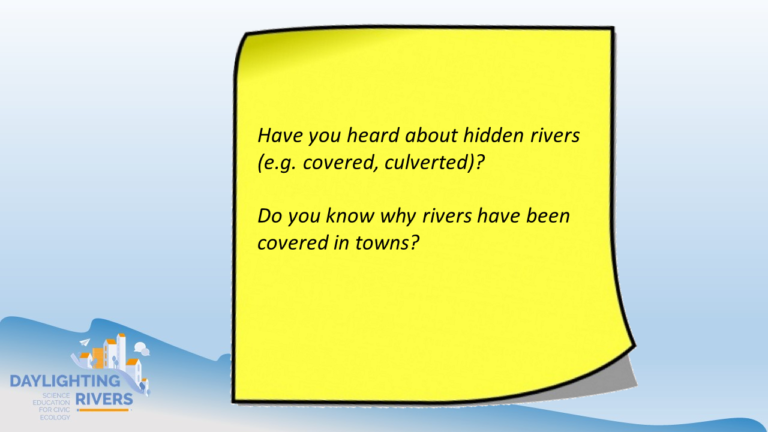HOW TO IMPLEMENT A DAYLIGHTING RIVERS PROJECT
DAYLIGHTING RIVERS project has developed learning methodology outlines that provide teachers with the basic information to make the learning process attractive and effective for students. The learning methodology is based on the principles and a cyclic model of Inquiry Based Learning and technologies and methodologies that are useful to address environmental themes related to rivers: water cycle, river ecosystem, hydrogeological risk, river management, historical aspects and river pollution. The nex sections summarize the steps of implementation with the class which also can be seen as a cyclic process.

INTRODUCTION of daylighting rivers project
To introduce the DAYLIGHTING RIVERS project to the students, you can start brainstorming about the local river. The presentation Introductory activity with the class can be used to this purpose. There are questions that can be posed to students to think about their town and rivers and engage them in knowing more about them.

WHAT WE KNOW - WHAT WE WOULD LIKE TO KNOW
WHAT WE KNOW - WHAT WE WOULD LIKE TO KNOW
In order to raise students’ interest in the project, it is important to know what they would really like to get known regarding topics and issues connected to rivers and skills but also the way they would like learn. The initial interests and base knowledge of the “actors” (students and teachers) are surveyed through questionnaires.
The following links access to questionnaires aimed to such purpose. Questionnaires are in English and they should be submitted before (and after) the implementation of the project. You can contact us to get the data or in alternative, you can contact us to copy the questionnaire (Please, in this case, cite the source).
Survey on students’ competences and interests: https://forms.gle/NSdJyDHyase3e6GP6
Survey on the on attitude toward STEM https://docs.google.com/forms/d/e/1FAIpQLSdaAlJtkNCbsCvtpvRnb-JJ-J8klMSV6e1XiAil5rDykgHUgQ/viewform
Survey on students’ career decision making https://docs.google.com/forms/d/e/1FAIpQLSdxXKDh9tR5FhBvhwvzApCPymq1CeBkTKEZ3nGU6pwikJT40A/viewform
Teachers’ survey on competences and interests https://forms.gle/QuoJ2XU77V2UbWZk6
Teachers’ survey on teaching efficacy https://docs.google.com/forms/d/e/1FAIpQLSeq-OlJcqVzRkEX1sKP-KwbJHFzo2fJi8LlVsxo5bdQD6S0sw/viewform
Teachers’ survey on teaching effectiveness https://docs.google.com/forms/d/e/1FAIpQLScTM4W4tyhpWTAfptunSbv4SQBW59WEVEQZ42JT4agRhdKpqw/viewform
IMPLEMENTATION Of the learning units with the class
According to the interest shown by the students during the introductory activity and the results of the surveys regarding environmental characteristics, human impacts, threats or aspects that are worth of promotion of your local river, you can choose one or more Learning Units from our list and adapt it to your context.
The Learning Units developed in this project concern 5 macro-themes: Water cycle, The impacts of human intervention on river ecosystem, The hydrogeological risk, River management, Climate change. 22 Learning Units based on the Inquiry Based Learning are available:
- Vegetal biodiversity of river ecosystems
- Animal biodiversity of river ecosystems
- Eutrophication
- Integration of rivers into the city plan
- Artifacts in the past and in the present
- Rivers in art
- Geology and geomorphology
- Socio-economic effects
- Hydraulic aspects
- Microclimate
- Effects of urbanization and land use
You can find the full list of Learning Units in English, Italian, Greek and Spanish here: https://www.daylightingrivers.com/learning-units-list/
CREATIVE-TECH TIME
Development of a Location Based Game!
LBG are particularly suited for creating educational experiences. Mobile media and augmented reality can fruitfully combine the advantages of educational video games with place-based learning. Georeferenced information collected in the field, pictures, data, stories etc. during the application of the Learning Units, can be communicated to a wider public in form of a game story, by storytelling. Location Based Games (visit the webpage “technologies”) allow players to play in a real environment and access information while having fun.
Alternatively, students can design an urban project of river regeneration, even using Geographic information system software (visit the webpage “technologies”).
DISSEMINATION
Promote your results and outcomes! All project outcomes should reach a wider community. This gives the opportunity to students to practice communicating to a wider public and enhance such skills. The presentation of the outcomes in front of different types of audience is a way to self-assess own learning and stimulate new investigations to address any further issues.
The dissemination can be done in:
- Science fairs,
- Open days,
- Exhibitions,
- Webinars
- Seminars
- Conferences
- etc.
Considet that your local community might be interested to know about the river quality or characteristics and this information might be also useful for the local authorities.
WHAT you have learnt
You may want to know how effective the learning process was and the efficacay of the project implementation. Here, are the links to the same questionnaires of the initial assessment. You can contact us to get the data or in alternative, you can contact us to copy the questionnaires (Please, in this case, cite the source).
Survey on students’ competences and interests: https://forms.gle/NSdJyDHyase3e6GP6
Survey on the on attitude toward STEM https://docs.google.com/forms/d/e/1FAIpQLSdaAlJtkNCbsCvtpvRnb-JJ-J8klMSV6e1XiAil5rDykgHUgQ/viewform
Survey on students’ career decision making https://docs.google.com/forms/d/e/1FAIpQLSdxXKDh9tR5FhBvhwvzApCPymq1CeBkTKEZ3nGU6pwikJT40A/viewform
Teachers’ survey on competences and interests https://forms.gle/QuoJ2XU77V2UbWZk6
Teachers’ survey on teaching efficacy https://docs.google.com/forms/d/e/1FAIpQLSeq-OlJcqVzRkEX1sKP-KwbJHFzo2fJi8LlVsxo5bdQD6S0sw/viewform
Teachers’ survey on teaching effectiveness https://docs.google.com/forms/d/e/1FAIpQLScTM4W4tyhpWTAfptunSbv4SQBW59WEVEQZ42JT4agRhdKpqw/viewform
If you want to know more about the results from Daylighting River pilot experiences, please read our evaluation reports.
Report on pilot students’ interests and competences:
Report on pilot students’ attitude toward STEM and future career:
